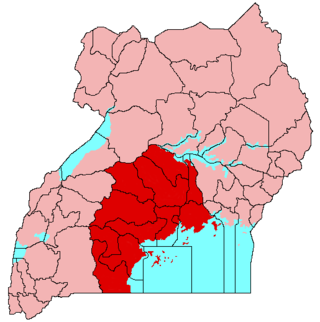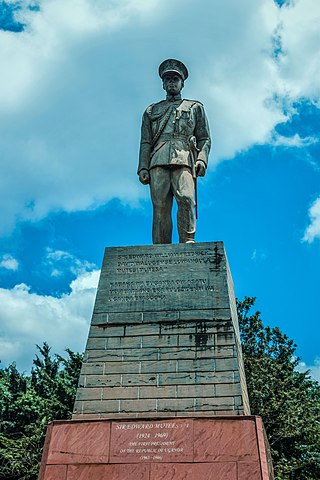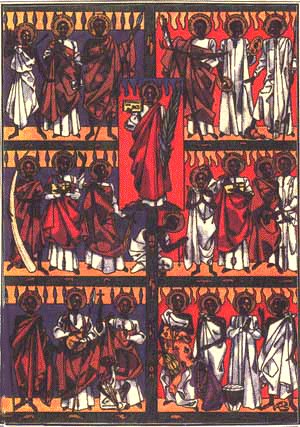
Uganda, officially the Republic of Uganda, is a landlocked country in East Africa. The country is bordered to the east by Kenya, to the north by South Sudan, to the west by the Democratic Republic of the Congo, to the south-west by Rwanda, and to the south by Tanzania. The southern part of the country includes a substantial portion of Lake Victoria, shared with Kenya and Tanzania. Uganda is in the African Great Lakes region, lies within the Nile basin, and has a varied but generally modified equatorial climate. It has a population of around 49.6 million, of which 8.5 million live in the capital and largest city of Kampala.

Kampala is the capital and largest city of Uganda. The city proper has a population of 1,680,000 and is divided into the five political divisions of Kampala Central Division, Kawempe Division, Makindye Division, Nakawa Division, and Rubaga Division.
The history of Uganda comprises the history of the people who inhabited the territory of present-day Uganda before the establishment of the Republic of Uganda, and the history of that country once it was established. Evidence from the Paleolithic era shows humans have inhabited Uganda for at least 50,000 years. The forests of Uganda were gradually cleared for agriculture by people who probably spoke Central Sudanic languages.

This is an article about former Ugandan Prime minister and president.

Buganda is a Bantu kingdom within Uganda. The kingdom of the Baganda people, Buganda is the largest of the traditional kingdoms in present-day East Africa, consisting of Buganda's Central Region, including the Ugandan capital Kampala. The 14 million Baganda make up the largest Ugandan region, representing approximately 16% of Uganda's population.

Frederick John Dealtry Lugard, 1st Baron Lugard, known as Sir Frederick Lugard between 1901 and 1928, was a British soldier, mercenary, explorer of Africa and a colonial administrator. He was Governor of Hong Kong (1907–1912), the last Governor of Southern Nigeria Protectorate (1912–1914), the first High Commissioner (1900–1906) and last Governor (1912–1914) of Northern Nigeria Protectorate and the first Governor-General of Nigeria (1914–1919).

The Protectorate of Uganda was a protectorate of the British Empire from 1894 to 1962. In 1893 the Imperial British East Africa Company transferred its administration rights of territory consisting mainly of the Kingdom of Buganda to the British government.

The history of Uganda from 1963 through 1971 comprises the history of Uganda from Ugandan independence from the United Kingdom to the rise of the dictator Idi Amin.

Sir Edward Frederick William David Walugembe Mutebi Luwangula Muteesa II was Kabaka of the Kingdom of Buganda in Uganda from 22 November 1939 until his death. He was the thirty-fifth Kabaka of Buganda and the first president of Uganda. from 1962-1966 when he was overthrown by Milton Obote. The foreign press often referred to him as King Freddie, a name rarely used in Uganda. An ardent defender of Buganda's interests, especially its traditional autonomy, he often threatened to make the kingdom independent both before and after Uganda's independence to preserve it. These firm convictions also later led to conflicts with his erstwhile political ally Milton Obote, who would eventually overthrow him.

Danieri Basammula-Ekkere Mwanga II Mukasa was the 31st Kabaka of Buganda who ruled from 1884 until 1888 and from 1889 until 1897.

The Democratic Party is a moderate conservative political party in Uganda led by Norbert Mao. The DP was led by Paul Ssemogerere for 25 years until his retirement in November 2005. John Ssebaana Kizito replaced Ssemogerere, and led the party until February 2010, when Norbert Mao was elected party president.

The Uganda Martyrs are a group of 22 Catholic and 23 Anglican converts to Christianity in the historical kingdom of Buganda, now part of Uganda, who were executed between 31 January 1885 and 27 January 1887.
The military history of Uganda begins with actions before the conquest of the country by the British Empire. After the British conquered the country, there were various actions, including in 1887, and independence was granted in 1962. After independence, Uganda was plagued with a series of conflicts, most rooted in the problems caused by colonialism. Like many African nations, Uganda endured a series of civil wars and coup d'états. Since the 2000s in particular, the Uganda People's Defence Force has been active in peacekeeping operations for the African Union and the United Nations.

The history of Buganda is that of the Buganda kingdom of the Baganda people, the largest of the traditional kingdoms in present-day Uganda.
Signed in March 1900, this agreement formed the basis of British relations with Buganda, the Kabaka (King) was recognised as ruler of Buganda as long he remained faithful to her Majesty, the Lukiko given statutory recognition. This was following another agreement signed in 1894 in which the Kingdom of Buganda, then known as Uganda, was declared a British Protectorate.This agreement is also known as the Buganda Charter of Rights and was upheld for more than 50 years.

Kampala Hill, commonly referred to as Old Kampala, is a hill in the centre of Kampala, Uganda's capital and largest city.
A non-sovereign monarchy, subnational monarchy or constituent monarchy is one in which the head of the monarchical polity, and the polity itself, are subject to a temporal authority higher than their own. The constituent states of the German Empire or the Princely States of British India provide historical examples; while the Zulu King, whose power derives from the Constitution of South Africa, is a contemporary one.

The Ganda people, or Baganda, are a Bantu ethnic group native to Buganda, a subnational kingdom within Uganda. Traditionally composed of 52 clans, the Baganda are the largest people of the Bantu ethnic group in Uganda, comprising 16.5 percent of the population at the time of the 2014 census.
Basil Kiiza Bataringaya was a prominent Ugandan politician in post-independence Uganda. He was the Leader of the Opposition at the beginning of the Apollo Milton Obote government, and then he changed parties and was appointed to the powerful role of Ugandan Minister of Internal Affairs. He was imprisoned, tortured, and was one of the first political prisoners to be executed by the Idi Amin regime.

George Wilson CB also known as bwana tayari - "Mr ready", amongst natives in the East Africa protectorate region, was a general African staff employee of the Imperial British East African company (1890–1891), was Sir Frederick D. Lugard's Chief Lieutenant from 1889 to 1890, and was the second in command during Lugard's caravan expedition to Uganda on 6 August 1890 where Lugard travelled with 120 Swahilis, 9 Persian transport attendants/agriculturalists and four other Europeans, besides George Wilson. They were Fenwick De Winton, William Grant and Archibald Brown. George Joined the Uganda Service/government in 1894 and was in civil charge of the Protectorate during the outbreak of the Sudanese mutiny. He was appointed first class transport officer then the 1st class assistant of the Uganda protectorate on 30 August 1894. Was the sub-commissioner of the Buganda Kingdom in 1895. Also Was Her Britannic Majesty's acting commissioner and the commander in chief of the Uganda Protectorate and the consul-general. Was awarded the C.B. on 2 January 1899. He was the first ever Chief collector for the Bunyoro district. He was tasked with drawing up the 1901 Ankole agreement and presenting it to the Ankole chiefs and the Ankole people before it was signed in August of that year with the blessing of Ankole and the British government with Wilson as its Chief negotiator and representative. Mr Wilson was then the deputy commissioner of the Uganda Protectorate at Entebbe, government house(1 April 1902 – 1904) and deputy governor of the protectorate. He was H.M. – His Majesty's commander in chief and acting commissioner of the Uganda protectorate (1904–1906) and. Was a fellow at the Royal Society of Arts and a silver medal recipient since 28 June 1907.















